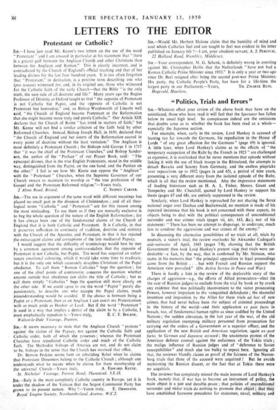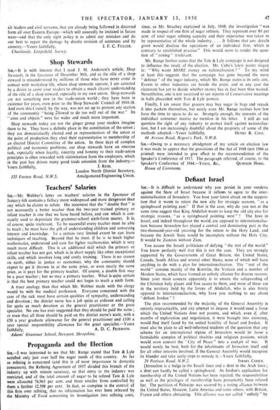4 4 Politics, Trials and Errors" SIR,—Whatever effect your review of
the above book may have on the uninitiated, those who have read it will feel that the Spectator has fallen
below its usual high level. So conspicuous indeed are the omissions that doubts arise as to whether the book has been read as a whole— especially the Japanese section.
For example, when, early in the review, Lord Hankey is accused of leaning too far towards the Germans, his repudiation in the House clf Lords "of any great affection for the Germans" (page 69) is ignored.
A little later, when Lord Hankey's claims as to the effects of "the temporary occupation of the Ruhr by the French in 1923" are challenged as excessive, it is overlooked that he never mentions that episode without linking it with the use of black troops in the Rhineland, the attempts to detach Bavaria and Saxony from Germany, and the endless pinpricks over reparations up to 1932 (pages ix and 65), a period of nine years, presenting a very different story from the isolated episode of the Ruhr, which is all that the review mentioned. Also the impressive statements of leading historians such as H. A. L. Fisher, Messrs. Grant and Temperley and Mr. Churchill, quoted by Lord Hankey to support his thesis (pages 67 and 68), are entirely suppressed in the review.
Similarly, when Lord Hankey is reproached for not sharing the fierce national anger over Dachau and Buchenwald, no mention is made of his repeated insistence that his book is not concerned with these aspects, its objects being to deal with the political consequences of unconditional surrender and war crimes trials (pages vii, xiv, 143, &c.), nor of his statement: "There has been no attempt to disparage, to underrate, much less to condone the aggressions and war crimes of the enemy."
In discussing the alternative possibilities of no trials at all, trials by neutrals, a victor's trial, the review overlooks Sir Alexander Cadogan's
aide-memoire of April, 1945 (pages 7-8), showing that the British Government then took Lord Hankey's present view that trials were un- desirable—a fact, by the way, that is confirmed BY -Mr. Stimson, who states in his memoirs that "the principal opposition to legal proceedings came from the British . . . but with French and Russian support the American view prevailed." (On Active Service in Peace and War.)
There is hardly a hint in the review of the deplorable story of the charges of aggression—e.g., the efforts of Allied prosecutors—elect (in the case of Russian judges) to exclude from the trial by hook or by crook any evidence that was politically inconvenient to the victor prosecuting Powers, however important to the vanquished defendants ; the shameful
invention and imposition by the Allies for these trials ad hoc of new crimes, that had never before been the subject of criminal proceedings in the history of the world—and their application ex post facto in
breach, too, of fundamental human rights as since codified by the United Nations: the sudden alteration, in the last year of the war, of the old military regulation exempting military personnel from prosecution for
carrying out the orders of a Government or a superior officer, and the application of the new British and American regulation, again ex post facto, to German and Japanese accused; the unanimous protest of the American defence counsel against the unfairness of the Tokio trials ;
the malign influence of Russian judges and of "deference to Soviet susceptibilities" and much else too bulky to repeat here. Ignoring all that, the reviewer blandly claims as proof of the fairness of the Nurem- berg trials that three of the accused were acquitted ! But he avoids mentioning the Russian dissent, or the fact that at Tokio there were no acquittals.
The reviewer has completely missed the main lessons of Lord Hankey's book, namely that, if war has to become an instrument of policy, the main object is a just and durable..peace ; that policies of unconditional surrender and victor trials do nothing to promote that object '; .that they have established fearsome -precedents for statesmen, naval, military and
air leaders and civil servants, that are already being followed in distorted form all over Eastern Europe—which will assuredly be imitated in future wars—and that the only right policy is to admit our mistakes and do our best to repair the damage by drastic revision of sentences and by































 Previous page
Previous page